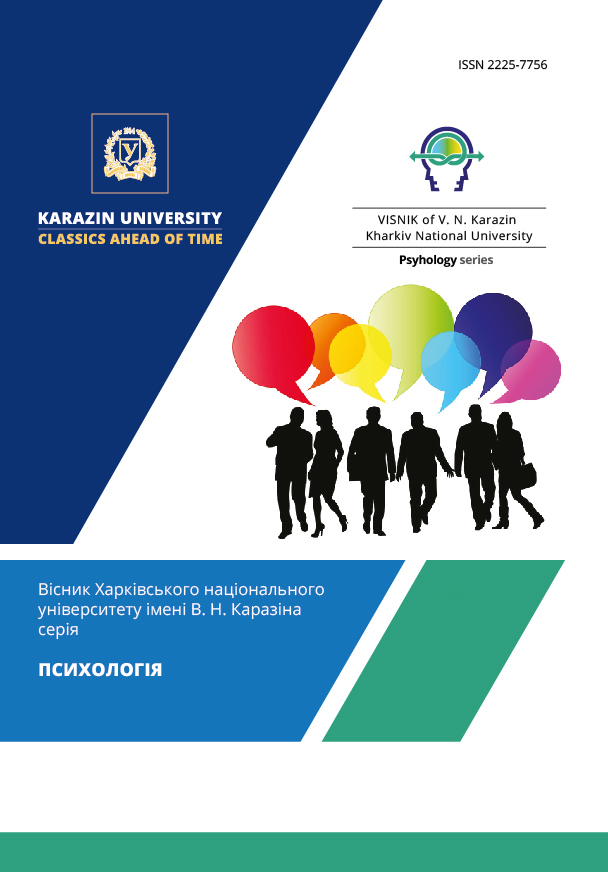Cognitive Processes of Adolescents Engaged in Scientific and Technical Creative Work
Abstract
The development of cognitive processes in modern adolescents is an urgent problem of psychology and the modern education system, because most teenagers do not develop, and even lose, their intellectual and creative abilities in traditional school, while there is a growing need for highly developed professionals who would creatively address complex and unexpected problems. The aim of the research was to study the peculiarities of thinking and memory of teenagers engaged in scientific and technical creative work in comparison with their peers who are not. The development of cognitive processes of modern teenagers is an urgent problem of psychology and the system of general secondary education, because most teenagers do not develop, and even lose their intellectual and creative abilities in a traditional school, at the time when the need for highly educated professionals who creatively solve complex,unexpected problems is growing. The purpose of the study was to study the peculiarities of thinking and memory of teenagers who are engaged in scientific and technical creative process in comparison with their peers who are not engaged in it. The research was conducted on the basis of the communal institution "Bezlyudivskyi Law Lyceum named after I. Ya. Pidkopai of the Bezlyudivsk Settlement Council" of the Kharkiv region. A total of 66 students aged 10 to 13 took part in the study, of which 30 are additionally engaged in scientific and technical creativity in clubs ("Robotics", "Modeling", "Young researchers", "Step to science"), and 36 - are not engaged in any types of creativity. It has been established that adolescents who are involved in the processes of modeling, construction, invention have higher abilities for systematized, planned, methodical intellectual activity compared to those adolescents who are not involved in this process. It was determined that memory and thinking are correlated among teenagers who are engaged in STC, which suggests the integration of the development of these processes in the course of creative activity. It was found that memory for numbers, memory for texts and operational memory are developed in those who are engaged in scientific and technical activities. They also have better developed logical thinking, the ability to systematize and plan, and general intelligence. In addition, teenagers engaged in scientific and technical activities are distinguished by close relationships between memory and thinking.
Downloads
References
Bila, I.M. (2014). Psychology of children's creativity. Kyiv: Phoenix. https://core.ac.uk/download/pdf/32309053.pdf [in Ukrainian].
Karpenko, V.V. (2013). Psychology of thinking: phenomenology, process and determinants. Naukovyi Visnyk Lvivskoho derzhavnoho universytetu vnutrishnikh sprav. (1). 32-42. http://nbuv.gov.ua/UJRN/Nvldu_2013_1_6 [in Ukrainian].
Kilderova, L.V. (2015). Formation and development of creative abilities of high school students in the process of creative activity in technology lessons. Naukovyi chasopys Natsionalnoho pedahohichnoho universytetu imeni M. P. Drahomanova. Pedahohichni nauky: realii ta perspektyvy. (51). 126-132. https://enpuir.npu.edu.ua/bitstream/handle/ [in Ukrainian].
Kuznetsov, M.A., Zayka, E.V., Khodykina, Yu.Yu. (2019). Psychology of motor memory: applied aspects. monograph. Kharkiv: Disa Plus. [in Ukrainian].
Leliva, V. Kobylyatska, M. (2021). Development of mental cognitive processes in adolescence. "Society and Personality in Modern Communication Discourse". Materials of the 3rd All-Ukrainian Scientific and Practical Conference, 2021, Zaporizhzhia. [in Ukrainian].
Lypetsky, O. (2022). Formation of cognitive independence of adolescents in scientific and technical circles of extracurricular educational institutions. Teoretyko-metodychni problemy vykhovannia ditei ta uchnivskoi molodi. 3(16). 185-194. https://lib.iitta.gov.ua/id/eprint/2326 [in Ukrainian].
Onyshchenko, V., Srybniuk, S., Korobko, B., Mayatyash, O. (2020). Basics of scientific research and scientific and technical creativity. Kyiv: Lira-K Publishing House. https://lira-k.com.ua/preview/12727.pdf [in Ukrainian].
Prodashchuk, S., Kravets, A., Bogomazova, H. (2021). Basics of scientific creativity. Kharkiv: UkrDUZT. [in Ukrainian].
Sereda, G. K. (2010). Selected psychological works / comp. E.F. Ivanova, E.V. Zayka. Kharkiv: KHNU V.N. Karazyn. [in Ukrainian].
Tarara, A.M. (2019). Scientific and technical creativity: a practical guide. K.: Pedahohichna dumka. https://undip.org.ua/library/naukovo-tekhnichna-tvorchist-praktychnyy-posibnyk/ [in Ukrainian].
Vaganova, N.A., Gulko, Yu.A., Latysh, N.M., Shepelova, M.V. (2022). Actual problems of the research of modern creative thinking. Vcheni zapysky TNU imeni V.I. Vernadskoho. Seriia: Psykholohiia. 33(72). 27-42. https://doi.org/10.32838/2709-3093/2022.2/24 [in Ukrainian].
Yakymchuk, B., Gurtovenko, O. (2023). Psychological peculiarities of the development of creative thinking of teenagers. Aktualni problemy psykholohii. Psykholohiia tvorchost. 15(1). 431-438. http://appsychology.org.ua/data/jrn/v12/i15/i/58.pdf [in Ukrainian].
Zaika, E.V., Kuznetsov, M.A. (2018). Psychology and pedagogy of memory. Kharkiv: PromArt. [in Ukrainian].
Zinchenko, P. I. (1996). Involuntary memorization. Kh: IPO Modek. [in Ukrainian].




